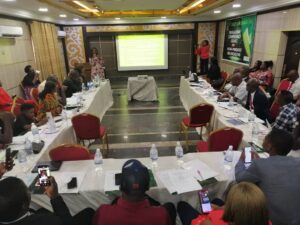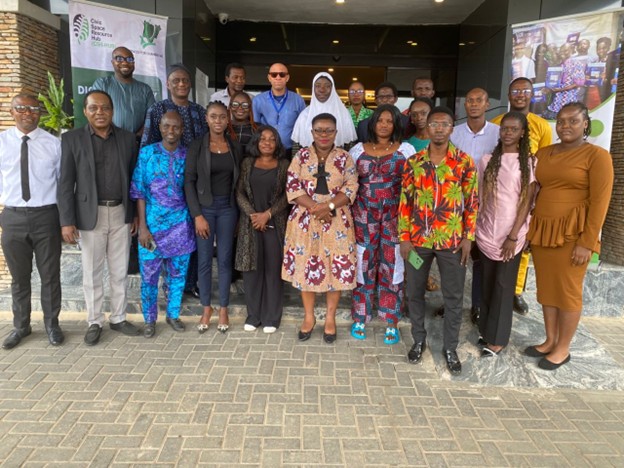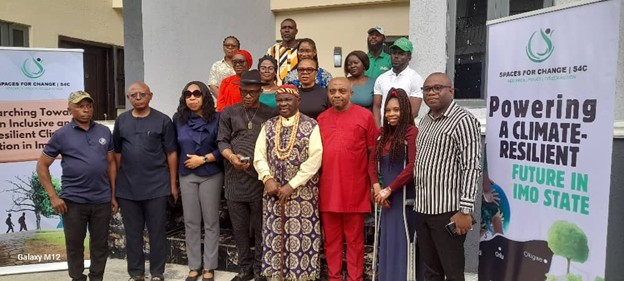On March 10, 2022, Spaces for Change | S4C organized the 4th edition of the NGO Regulatory Compliance Clinic for non-governmental organizations (NGOs) operating in the South-South region of Nigeria, with support from Ford Foundation. Thirty (30) representatives of NGOs and host community groups in the region benefitted from the presentations, exercises, training and plenary sessions facilitated by S4C and regulatory bodies like Economic and Financial Crimes Commission (EFCC), Special Control Unit against Money Laundering (SCUML) and Corporate Affairs Commission (CAC). The aim of the Complaince Clinic is to improve the regulatory compliance culture among CSOs across the country, positioning them to deliver on their charitable operations more effectively and with limited restrictions.
The resource persons walked the participants through the applicable laws and reporting requirements expected of them as NGOs. In particular, participants gained an in-depth understanding of anti-money laundering and countering financing of terrorism (AML/CFT) risks applicable to the NPO sector and their founding instruments such as the Financial Action Task Force (FATF) Recommendations. Specifically, Recommendation 8 (R8), though now revised, red-flags non-profits as vulnerable to terrorism financing and therefore requires countries to review the adequacy of legal frameworks that detect, prevent and protect organisations from the risk of exploitation by terrorist elements. Other issues that were also extensively discussed are the FATF’s Mutual Evaluation Process (MER) rating and the regulatory compliance requirements contained in the CAMA 2020. Participants also learned about the day-to-day compliance processes in the running of organisations like implementation of AML/CFT frameworks and checklists in the workplace, filing processes under CAC and SCUML, and how to evaluate ML/TF risks in a non-profit organization.
This edition of the Compliance Clinic, unlike others, included host community representatives drawn from all the states in the South-South region. The Host Community Development Trusts as specified in Chapter 3 of the PIB 2021 will be registered as an incorporated trustee, thereby subjecting them to the same regulatory obligations as NGOs. The host community representatives in the audience were sensitized on the implications of this new law. The Clinic came to an end with participants adequately informed about their regulatory obligations as NGOs. Feedback from the Clinic suggests an increasing desire for improvements in regulatory compliance in the Nigerian non-profit sector.
Some feedback from the Compliance Clinic:
Did you find the discussions interesting and beneficial to your work? If yes, please specify.
- Yes, especially the CAC case, it will help us update our records regarding our deceased board member. We alsio learned about the risk involved in associating with some donors/individuals.
- I now have an in-depth knowledge of the CAMA 2020 as it affects NPO’s.
- It helped me to know several means in which as an NGO can be indicted and how to reduce the risks.
- The presentations highlighted opportunities for further work for our organization, particularly host communities development fund.
- It helped to understand how non-profit regulation works.
- Our NGO will now do the required compliance.
- Yes, the information given by SCUML official greatly clarified doubts regard the reporting.
- As an actor in NPO space, the knowledge of regulatory compliance and regulatory bodies and their functions has been very beneficial to the operators of NPOs.
- Yes it is interesting because it has broadened my knowledge on laws that regulate the NPO sector.
- Yes, because it will help me to understand the risk of financing terrorism in my community.
- Risk assessment and to be careful in the area of money laundering.
- The discussion was very interesting because of the tremendous and significant awareness established.
- Yes, because the discussion was interactive and educating such that my community people now know how to relate with NGOs that they interface with.
- The keeps my organization on its heels, especially when regulated and charged to submit reports.
What did you enjoy most about the forum?
- The discussions, follow-up to the presentations.
- It was participatory and interactive allowing all participants air their views.
- Friendly and interactive forum with useful interaction and intelligent contribution
- Facilitator’s method of teaching and participant contribution.
- I enjoyed all the section, mostly to know more about AML/CFT in Nigeria.
- The presentations. The environment. Procedures and processes of the clinic.
- The presence of senior team members ofregulatory agencies who gave direct responses to questions and challenges raised.
- The interactive sessions of questions and answers.
- Extra knowledge on the FATF recommendation, especially R8 as well as the result of the mutual evaluation exercise in Nigeria.
- The lecture insight in money laundering, need for NGOs to submit their annual reports and a deep insight on TF.
- The awareness, clarifications and active involvement in the process.
- The interactive sessions during the issue of CAMA questions and bordering on certifications.




